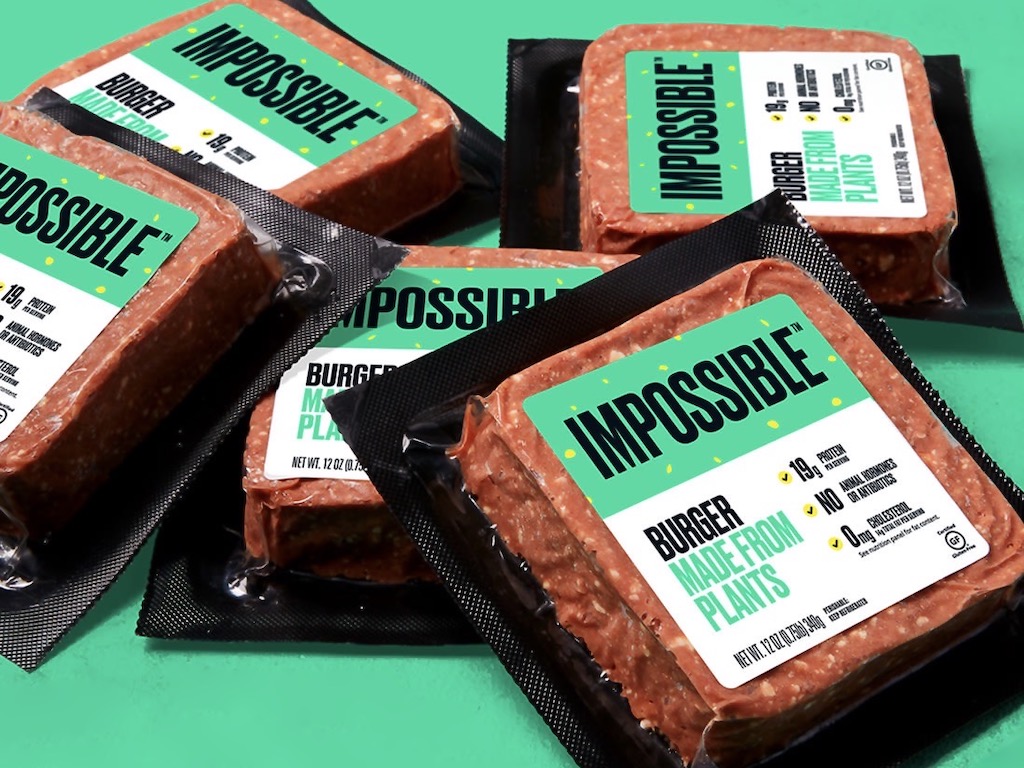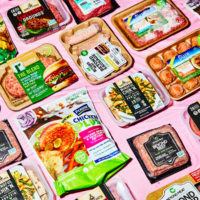
Source: Impossible Foods
Every week we track the business, tech and investment trends in CPG, retail, restaurants, agriculture, cooking and health, so you don’t have to. Here are some of this week’s top headlines.
Major progress has been made this week in the race for alternative meat makers to achieve price parity with industrially farmed meat . Impossible Foods has cut its prices by 20% to $5.49. Meanwhile, Israel-based Future Meat Technologies has brought its cultured chicken down to $7.50.
Major investments and acquisitions also made headlines, within the alcohol delivery sector in particular. Uber has agreed to acquire alcohol delivery platform Drizly for $1.1 billion, and Vivino has raised $155 million.
Last but not least, Good Eggs has raised $100 million to expand to Southern California.
We need your support. Producing our newsletter takes a lot of time and resources, and we need to change our business model to keep it going. To date, we’ve funded our work through our events, sponsorships and consulting, which are all on hold due to the pandemic. If you find our newsletter to be a valuable resource, we hope you will consider making a one time or monthly contribution, so we can keep the newsletter going and free for those who can not afford a subscription fee. Whether it’s $5 or $500 every bit helps and shows us that you value our work. Not able to contribute right now? You can help by sharing our newsletter with friends and colleagues.
Check out our weekly round-up of last week’s top food startup, tech and innovation news below or peruse the full newsletter here.
1. Impossible Foods Lowers Grocery Store Prices Amid Pandemic-Fueled Retail Expansion – CNBC
The plant-based meat maker is cutting its retail price for grocery stores by 20% to $5.49.
2. Big Food Lost $12B in Sales to Small CPGs and Private Label in 2020 – Food Dive
The pandemic accelerated a five-year trend of large manufacturers losing market share to smaller players, but consumers’ return to normal travel patterns should slow the momentum.
3. Uber Agrees to Buy Alcohol Delivery Service Drizly for $1.1B – CNBC
Following the completion of the transaction, Drizly’s marketplace will be integrated with the Uber Eats app.
4. Israel: Future Meat Technologies Makes Cell-Based Chicken Costing $7.50 and Gets $26.75M Funding – Food Dive
The company is planning to get its products on plates in 2022 — or earlier if regulatory agencies move faster. Funding came from investors including Tyson Foods, Archer Daniels Midland, S2G Ventures and others.
5. AppHarvest Starts Trading After Merger Valuing Company at $1B – Food Dive
The company has completed its merger with Novus Capital. The transaction will provide $475m in gross proceeds to AppHarvest and value the new company at $1b.
6. Vivino Raises $155M Series D for its Wine App and Online Marketplace – The Spoon
Kinnevik and Sprints Capital led the round. New capital will go towards geographical expansion and to incorporate more personalized AI into its platform.
7. Good Eggs Raises $100M and Plans to Launch in Southern California – TechCrunch
Glade Brook Capital Partners led the round. In addition to geographic expansion, funding will allow the company to add new products and improve the e-commerce experience.
8. How Thrive Market, Once Upon a Farm, Omsom and Tagger Media Are Reimagining Discovery, Acquisition and Loyalty
The unprecedented events of the last year forced food brands to quickly adapt to their customer’s needs and shopping behaviors, while also navigating a rapidly changing grocery retail landscape. Founders share how they grew their businesses through new approaches to customer discovery, acquisition and loyalty.
9. 5 Actions to Reboot Food Retail
We have a responsibility to all stakeholders in our supply chains to pursue deep and substantive change, starting with the social and economic issues that underlie how we grow, make, distribute and sell food. Errol Schweizer, host of The Checkout Radio and former VP of grocery for Whole Foods Market, shares 5 actions food retailers, brands and supply chain stakeholders must take to create a more fair, just and sane food system.
10. Hormel Nears $3B Deal to Buy Kraft Heinz’s Planters – Bloomberg
Some of the aging brands at Kraft that were previously expected to be considered for the auction block got another life during the pandemic, when homebound consumer turned to familiar labels and comfort foods for sustenance.
11. Denmark & Sweden: McDonald’s Quietly Rolls Out McPlant Burger in Test Markets – Bloomberg
The fast food chain’s trials in Denmark and Sweden started in January. Its McPlant was co-developed with Beyond Meat.
12. After Years of Struggle, New York’s Street Food Vendors Win Long-Sought Reforms – The Counter
The city voted to issue 4k new permits over the next decade, among other changes. Advocates say it’s a pathway to financial relief and less police harassment.
13. Food Stamp Spending Jumped Nearly 50% in 2020 – Politico
The Supplemental Nutrition Assistance Program, still known to many as food stamps, cost nearly $90b in fiscal year 2020, a major jump from just over $60b in 2019.
14. Food & Ag Anti-Racism Resources + Black Food & Farm Businesses to Support
Check out our list of resources to learn about systemic racism in the food and agriculture industries. We also highlight Black food and farm businesses and organizations to support.
Our newsletter is the absolute easiest way to stay on top of the emerging sector, so sign up for it today and never miss the latest food tech and innovation news and trends, Already signed up? Share the love with your friends and colleagues!





